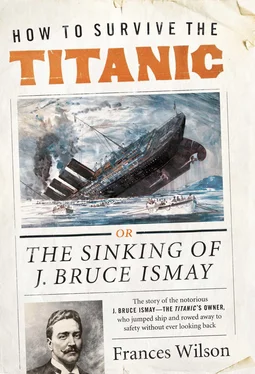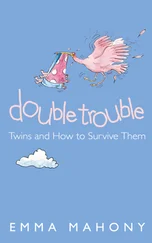Sir Rufus Isaacs put the issue of the Marconigram aside for the moment to question Ismay on the speed of the ship. How fast was the Titanic going on her final day? I really have no absolute knowledge myself, replied Ismay, as to the number of revolutions. I believe she was going seventy-five on the Sunday. But really Mr Ismay, responded Isaacs with evident exasperation, if you will just search your recollection a little. Remember that this question of speed interested you very materially. You, as Managing Director of the Company, were interested in the speed of the vessel? Naturally, Ismay conceded. Our intention, he then said, had been if the weather was suitable on the Monday or Tuesday, to run the ship at her full speed of seventy-eight revolutions. With whom, wondered Isaacs, would you discuss this question of driving her at full speed on the Monday or Tuesday? Presumably, the court assumed, this decision would have been made in conversation with the Captain, but Ismay had insisted that he had not talked to the Captain at all during the voyage. The only man I spoke to in regard to it, he said, was the Chief Engineer in my room when the ship was in (Queenstown. Will you explain that? asked Isaacs. It is not quite clear why you should discuss the question in Queenstown? The Titanic had stopped for passengers first at Cherbourg and then at Queenstown in Ireland, before beginning her journey to New York. The reason why we discussed it at Queenstown was this, explained Ismay at length. Mr Bell came into my room; I wanted to know how much coal we had on board the ship, because the ship left after the coal strike was on, and he told me. I then spoke to him about the ship and I said it is not possible for the ship to arrive in New York on Tuesday. Therefore there is no object in pushing her. We will arrive there at 5 o’clock on Wednesday morning, and it will be good landing for the passengers in New York, and we shall also be able to economise our coal. We did not want to burn any more coal than we needed.
‘Never mind about that,’ said Isaacs, brushing aside the issue of the ship’s coal supply, ‘that does not answer the question I was putting to you… the question I am putting to you is this, when was it that you discussed putting her at full speed on the Monday or the Tuesday?’ The discussion about the ship’s speed had been at the same time as the discussion about coal, said Ismay, and had taken place in his cabin on the Thursday afternoon. ‘You have not told us about that,’ Isaacs noted, as Ismay fell further down the well. Ismay’s only other mention of Joseph Bell, the Chief Engineer who died that night, had been in the account of his actions following the collision, when the two men had met on the main staircase and Ismay had asked him the extent of the damage to the ship. This earlier scene, in which Ismay and Bell sat whispering head to head in his cabin at Queenstown, had fortunately escaped the notice of Senator Smith and its revelation now was damning evidence of Ismay’s role as, in Conrad’s words, a ‘double captain’. Bell, one year older than Ismay, was from Maryport, the home town of Thomas Ismay and the place to which Ismay Senior would remain loyal throughout his life, making a point of employing Maryport residents on the White Star liners. Joseph Bell and Bruce Ismay had the same roots; of all the people on board the Titanic, Bell was the man with whom Ismay shared the most.
‘Then you did know on the Sunday morning,’ Isaacs continued, ‘that in the ordinary course of things between then and the Monday evening you might be increasing your speed to full speed?’ I knew, Ismay said, if the weather was suitable either on the Monday or the Tuesday the vessel would go at full speed for a few hours. In order for the ship to reach her maximum level of revolutions, further boilers would have to be lit, which implied that the Titanic had been gathering speed on the Sunday in preparation for her trials on Monday. When Ismay was asked whether the Captain was aware that the ship was to increase her speed, he answered, simply, No.
‘Now, Mr Ismay,’ said the Irish Thomas Scanlan, who had taken over the questioning. ‘I want to ask you this question: What right had you, as an ordinary passenger, to decide the speed the ship was to go at, without consultation with the Captain?’ Ismay did not have time to answer, because Lord Mersey intervened.
‘Well, I can answer that — none; you are asking him something which is quite obvious; he has no right to dictate what the speed is to be.’
‘But he may,’ said Scanlan, ‘as a super captain.’
Ismay apparently suppressed a smile of embarrassment as nervous laughter ran through the hall.
‘What sort of person’, inquired Mersey, ‘is a “super captain”?’
‘I will tell you as I conceive it, My Lord,’ said Scanlan. ‘It is a man like Mr Ismay who can say to the Chief Engineer of a ship what speed the ship is to be run at.’
A ‘super captain’, like Nietzsche’s ‘superman’, is beyond accountability.
Was Ismay a super captain, a double captain, or a double agent, living both the life of the ship and the life of the passenger? In America, he had spoken of our intention to run the ship at full speed on the Monday or Tuesday but Senator Smith had not asked to whom the ‘our’ referred. Ismay, it was now pointed out, repeatedly used the word ‘our’ in relation to the Titanic, and it was drawn to his attention that during the US inquiry he had said that we were working her up to full speed. ‘You see, you use the personal pronoun, “we”.’ I could not, Ismay drily replied, have said I was gradually working her up. But, it was suggested, Ismay could have said ‘the Captain’ rather than ‘we’, if it was indeed the Captain whom Ismay was talking about.
On 18 April, a statement had appeared in the Daily Mail by Alexander Carlisle, the brother-in-law of Lord Pirrie and former general manager of Harland & Wolff. In the original plans for the Titanic, Carlisle revealed, provision had been made for having four lifeboats per davit. Questioned today about Carlisle’s claims, Ismay denied having ever seen any such design. Nor did he know that anybody connected with the White Star Line saw such a design. Moments later he conceded that, I saw the design I have no doubt; I saw the design with the rest of the ship, after which he once again insisted that I tell you I have never seen any such design. Have you ever heard of it before? asked Lord Mersey. No, I have not, Ismay confirmed.
‘I take it,’ said Scanlan, ‘that this is what you say, that you have no recollection of seeing the design at all.’ Ismay replied that this indeed was the case. ‘Or the fitting up of the boats at all?’ Oh, yes, he said that he had seen the design for the fitting up of the boats. ‘You did see it?’ asked Scanlan. Oh, yes, repeated Ismay.
Lord Mersey tried to clarify things. ‘Have you ever until today heard that there was a design for the Titanic by which she was to be provided with forty lifeboats?’ No, My Lord, Ismay said.
Ismay’s meanings were slipping in and out of focus, and Scanlan moved the questions on.
Thomas Scanlan’s interrogation had cornered Ismay, but it was the Welsh MP, Clement Edwards, who had him pinned wriggling to the wall. Edwards focused on Ismay’s ‘moral duty’ on board the ship and his right to survive the Titanic at all. ‘You’, he asked, ‘were one of those responsible for determining the number of lifeboats?’ Ismay agreed. ‘Did you know that there were some hundreds of people on that ship who must go down with her?’ Ismay said that he had known this. ‘Has it occurred to you,’ asked Edwards, ‘that, apart from the Captain, you, as the responsible managing director, deciding the number of boats, owed your life to every other person on that ship?’ No, said Ismay firmly, it has not. If, Edwards reasoned, Ismay had been helping to load the women and children into the lifeboats, then why had he not searched for further women and children on other decks before jumping into Collapsible C himself? A man in his position should surely show himself prepared to take some level of personal risk. Ismay’s not having moved from the starboard side looked suspiciously as if he was ensuring his own survival rather than taking responsibility for the ship’s community of ‘other’ passengers.
Читать дальше












